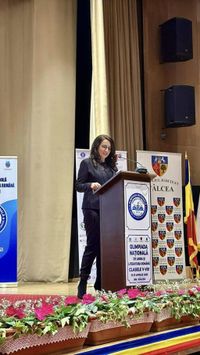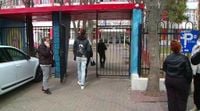In a striking juxtaposition of educational events, Romania finds itself at the crossroads of celebration and concern. While the National Romanian Language and Literature Olympiad for grades V-VIII is taking place in Râmnicu Vâlcea, a recent simulation of the Baccalaureate exam has revealed alarming deficiencies in language proficiency among high school students.
The Olympiad, running from April 10 to April 13, 2025, has attracted around 380 students and educators, showcasing the country's commitment to nurturing linguistic talents. Vice-Mayor Carmen Preda opened the event with an emotional address, expressing pride in hosting such a significant competition. "This Olympiad is a celebration of the passion for the Romanian language and the values of education," she stated, wishing all participants success.
However, the optimism surrounding the Olympiad is sharply contrasted by the results of the Baccalaureate simulation, where a staggering one-third of candidates scored below 5 on their Romanian language assessments. Teachers involved in the grading expressed their dismay, noting that many students wrote as if they were in the third grade, rather than preparing for a high school exit exam.
Some students struggled to identify key literary works, with reports indicating that in certain schools, half the students could not recognize a psychological novel when asked. One student humorously misidentified the novel Ion as one about a character who listens to the earth, suggesting he had psychological issues. Another response noted, "Camil Petrescu is a great and beloved writer, just like what he wrote. That is, the description of the first night of love and the last night of love. In fact, the other way around (forgive me!)." This mix-up highlights a significant disconnect between the students' understanding and the expectations of the exam.
Responses to poetry questions were equally perplexing. Students interpreted the poem Iarna in bizarre ways, with one candidate claiming, "The author was not thinking clearly because of the cold and even thought he saw white oxen pulling a sleigh." Another wrote, "The poet searches through the snow for traces of his beloved, but instead found some dove claws." Such interpretations not only reflect a lack of comprehension but also a failure to engage with the text critically.
The humor did not end there; a candidate misinterpreted a text about a music-loving teacher, stating, "After he played symphonic music, the teacher broke the author's shyness." The text actually described how each music session was preceded by the teacher's introduction of the musical excerpt, leading to the candidate's confused conclusion that the teacher's exposure was what marked the students profoundly.
These examples of misunderstanding were not isolated incidents. A student even failed to grasp the abbreviation of the writer Ștefan Augustin Doinaș, stating, "Young Aug was having fun at the theater, even though he was at school." Such responses raise questions about the effectiveness of the current educational strategies in preparing students for critical thinking and literary analysis.
Despite these challenges, the Olympiad stands as a beacon of hope, emphasizing the importance of language and literature in education. The event not only fosters competition among young scholars but also encourages a deeper appreciation for the Romanian language. As Vice-Mayor Preda noted, this gathering is a vital opportunity for students to showcase their talents and passion for literature.
However, the stark reality of the Baccalaureate simulation results cannot be ignored. Only three out of 120,000 prospective graduates achieved a perfect score of 10 in Romanian language, while over 20,000 students opted out of the simulation entirely. This alarming trend highlights a systemic issue that educators and policymakers must address urgently.
The juxtaposition of the Olympiad's celebration of linguistic prowess against the backdrop of the Baccalaureate exam's disappointing results serves as a call to action. It underscores the necessity for educational reform and enhanced support for students to improve their language skills. As the country celebrates its literary talents, it must also confront the sobering reality of its educational shortcomings.
In summary, while the National Romanian Language and Literature Olympiad shines a light on the potential of young minds, the disheartening outcomes from the Baccalaureate simulation reveal a pressing need for educational improvement. The future of Romania's literary landscape depends on addressing these challenges head-on, ensuring that all students can express themselves with clarity and confidence.






